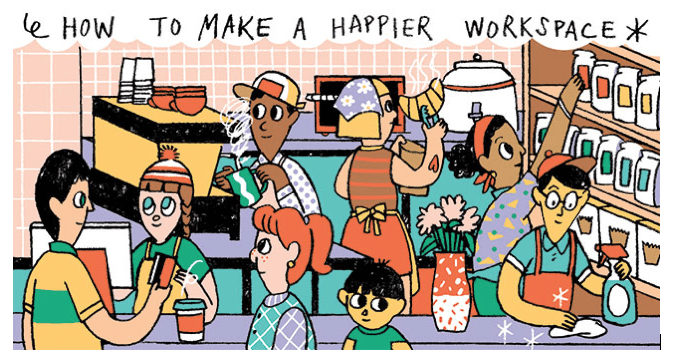
Illustration by Alabaster
Introducing the latest series on Barista Mag’s blog: How to Make a Happier Workspace
BY ASHLEY RODRIGUEZ
SPECIAL TO BARISTA MAGAZINE
I have a question for you.
Have you ever gone to a restaurant or a café and been served by someone you didn’t like? Maybe you thought, œThis person shouldn’t be in service, or even that you might not come back. If you’re a café owner or manager, this scenario should make you cringe, both because you recognize the loss of business, but also because this has probably happened to every single person reading this. Rude waiters, disengaged baristas, people who make the process or ordering a drink or food as difficult and unpleasant as humanly possible.
Now consider another scenario. Let’s say you’re a barista or working at a restaurant, and you absolutely hate your job. You’ve worked as a barista or waiter before, and have enjoyed it, but perhaps management at your current place of employment is unclear or disorganized, or you have no idea what to expect every time you walk into the store, or your coworkers are lazy and nobody is doing anything to fix it. And now, with all that, you have to talk to people for eight straight hours. Your job doesn’t have to be bad, but it seems like there’s hurdle after hurdle put in front of you to make your job as hard as possible.
The lesson here is that bad service is not inherent to a particular person. While there may be a few people who perhaps should consider a career outside of service, most people can be excellent service professionals. In coffee, we spend a lot of time thinking about the things we serve customers and the layout of our cafés, but what makes a space ”and what ultimately matters when you consider profits and revenue ”is how people feel when they talk to the people behind the bar. It doesn’t matter how beautiful your café is or how delicious the coffee tastes if the person serving the coffee is miserable and feels unhappy at work.
Your initial thought might be to fire the unhappy barista ”but I don’t think that’s the way to handle it. I’ll argue in this series, which will appear each Saturday here on Barista Magazine’s blog, for the importance, and subsequently the power of, employee morale. Over the next few weeks, we’ll talk about how morale, or how happy employees are at work, translates to better coffee, loyal customers, and invested employees.
I’m not describing a perk or a luxury or a nice thing to have Š ” Šemployee morale is directly tied to customer service both positively and negatively, and multiple studies have been done that link employee satisfaction to overall customer experiences and positive business outcomes. Intuitively, that must make sense to most people. In this series, we’ll look at different studies and papers that indicate the level of satisfaction employees feel at work affects productivity and profitability.
The idea that employee morale is important isn’t new, but most of the discussion around employee happiness has been centered on the tech industry. The inspiration for this series came from reading an article about the HR department at Google, which is led by Lazlo Bock. Bock was instrumental in improving the retention rate of employees at Google, which consistently rates as the best place to work in America. Obviously, a small coffee shop will never make the same sort of waves or make the same impact as Google, but that doesn’t mean we don’t have something to learn from industries that are doing a good job at keeping their employees engaged and excited.
Perhaps you’re reading this and you’re reminded of a terrible café or business you worked for. Perhaps you’re reading this and maybe worry you own or operate a business where you’re not sure if people are happy or not. What’s exciting about improving employee morale is that it’s one of the cheapest things you can do to improve your business. To build a positive work environment involves active management and some hard work, but it’s something that as a leader, you have a ton of autonomy over. And just because morale might be low now doesn’t mean that can’t change. It’s both easy and difficult, and most of this series will involve lots of communication, some hard work, and probably a pizza or two.
Employee morale is important through various stages of the hiring, maintenance, and eventual change and turnover of a cafe, and we’ll systematically look at each of these stages and provide strategies to improve the attitude and outlook of your staff. Before we do that, we have to determine a baseline for your cafe: tune in next week when we talk about how to assess employee morale amongst your staff.
ABOUT THE AUTHOR
Ashley Rodriguez thought that she’d take a break from teaching middle school science and putz around in a coffee shop for a few months. She ended up digging it way more than teaching (and was vaguely better at it). After spending 5 years making coffee in New York, she moved to the San Francisco Bay Area where she worked for Sightglass Coffee for three years. She recently decided to give full-time coffee writing a go, though she can still be found working bar shifts now and again in Temescal Alley in Oakland. Follow her on Twitter at @ashisacommonname


